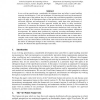Free Online Productivity Tools
i2Speak
i2Symbol
i2OCR
iTex2Img
iWeb2Print
iWeb2Shot
i2Type
iPdf2Split
iPdf2Merge
i2Bopomofo
i2Arabic
i2Style
i2Image
i2PDF
iLatex2Rtf
Sci2ools
RE
1995
Springer
1995
Springer
Managing inconsistencies in an evolving specification
In an evolving specification, considerable development time and effort is spent handling recurrent inconsistencies. Tools and techniques for detecting and resolving inconsistencies only address part of the problem: they do not ensure that a resolution generated at a particular stage will apply at all subsequent stages of the specification process. Previously, we have advocated tolerance and management of inconsistency, rather than strict enforcement of consistency. The advantages of this approach include the ability to delay resolution, facilitation of concurrent development, and greater flexibility in development strategies. However, this approach does not prevent inconsistencies themselves from evolving, and it does not ensure that resolved inconsistencies remain resolved throughout subsequent developments. We address these problems by explicitly recording relationships between partial specifications (ViewPoints), representing both resolved and unresolved inconsistencies. We assume ...
Considerable Development Time | RE 1995 | Recurrent Inconsistencies | Software Engineering | Unresolved Inconsistencies |
Related Content
| Added | 26 Aug 2010 |
| Updated | 26 Aug 2010 |
| Type | Conference |
| Year | 1995 |
| Where | RE |
| Authors | Steve M. Easterbrook, Bashar Nuseibeh |
Comments (0)

